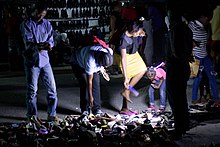Mitumba (clothing)
Mitumba ( Swahili , plural to mtumba , dt. Bundle ) is a term for old clothes bundled in plastic from old clothes collections , which are donated to charitable non-governmental organizations in industrialized countries and to the markets of developing countries via intermediaries to be sold there. In a broader sense, trading in Mitumba is a phenomenon of globalization . The main market for the trade in used clothing is Africa .
From the donation to the sale of the clothes
Charitable organizations such as the DRK or Caritas regularly collect donations from used clothing in industrialized countries. The collected used clothes are sorted, bought by private companies and delivered to second-hand markets in developing countries. In Dar es Salaam , one of the largest hubs for Mitumba, the goods are then sold at prices that generate a profit for the seller , but undercut the prices of the locally based textile producers. The possibility of being able to sell clothing at profitable low prices arises from the fact that it is acquired by the seller himself almost free of charge.
criticism
A frequent criticism of the sales methods is that the operators of the second-hand shops have an immense competitive advantage over conventional, local clothing manufacturers with the sale of donated old clothes . In Tanzania 80,000 jobs were in the textiles industry consequently reduced .
Michael Okema, Tanzanian political scientist and publicist , argued, however, that the problem with the Tanzanian textile industry was not the flooding of the market with Mitumba, but the lack of incentives for investors to even build a functioning textile industry in Tanzania. The fact that such a thing, like in Kenya , for example , existed before Mitumba was sold, was an invention of European critics. In Cameroon, for example, there is no textile industry that could independently meet the domestic demand for clothing, especially modern clothing that is popular among young people .
The argument that trading in Mitumba will result in the loss of numerous jobs in the local textile industries can also be countered by the fact that this trade creates jobs. For example, it is often necessary to have the old clothes adjusted afterwards by tailors , as the average dress size in industrialized countries is often larger than that in developing countries. Numerous local small traders who buy the goods at the market and sell them themselves also make a living from international trade with Mitumba.
Another advantage of second-hand clothing is cited as the fact that, despite its lower selling price, it is of far better quality than clothing produced by clothing manufacturers in developing countries. It is also claimed that the target groups for second-hand clothing and locally manufactured goods are not the same. The demand for Mitumba is therefore mainly from the upper class , who want to wear clothes that are as individual as possible .
See also
literature
- Pietra Rivoli: The Travels of a T-Shirt in the Global Economy: An Economist Examines the Markets, Power and Politics of World Trade . Wiley & Sons, Hoboken, New Jersey 2009.
Individual evidence
- ↑ mitumba . Oxford English Dictionary . Retrieved November 9, 2011.
- ↑ a b c Witness: Mitumba: The second-hand road . From Al Jazeera English . Retrieved November 9, 2011 (video no longer available)
- ↑ a b c Michael Höft: The kilo for 1.20 dollars ( Memento of the original from May 24, 2014 in the Internet Archive ) Info: The archive link was inserted automatically and has not yet been checked. Please check the original and archive link according to the instructions and then remove this notice. . In: The time . Zeitverlag, Hamburg 2011. Edition 45/2011.
- ↑ Michael Okema: Arguments Against Mitumba Won't Wash . The East African. Retrieved November 9, 2011.
- ↑ Many reasons for Mitumba . Oeko-fair.de. Retrieved November 9, 2011.
- ↑ Second- hand clothing creates work and income . Oeko-fair.de. Retrieved November 9, 2011.
